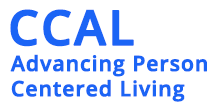By Martin Bayne: Martin has been an assisted living resident for more than 10 years, and credits many of his ideas to his experiences as a Zen Buddhist monk and an MIT scholar. His website is TheVoice0fAgingBoomers.com; his literary journal showcasing authors ages 60 and older can be found at TheFeatheredFlounder.com.
Imagine you are 70, your spouse has just died and your children have decided it's no longer safe or prudent for you to live alone. It's your worst nightmare complete with memories of the insecurities and trepidation felt in the first days of school, but this time it's an assisted living facility, and, like you, the other kids are in their 70s, 80s and 90s. For many assisted living residents, the first days and weeks are the most traumatic. Many arrive in a surreal haze; some just days after burying their spouse; others following years of steady losses to a chronic illness like Parkinsons. And then there are the legions of poor souls with cognitive disorders, who neither understand why they're sleeping in a different bed nor know who just served them breakfast. And every resident is susceptible to the ambient despair that comes with the recognition of their community's unprecedented levels of dementia, disability, depression and death.
Rethinking Assisted Living At age 52, I entered an assisted living facility because I had young-onset Parkinson???s disease. But my knowledge and experience of long-term care go beyond living in an assisted living facility. As the publisher from 1993 to 2001 of the website, MrLTC.com, I have had the opportunity to interview Hillary Clinton, Jimmy Carter, Clint Eastwood and a number of other prominent Americans about long-term care.
For many assisted living residents, the first days and weeks of residency are the most traumatic.
After nearly a decade as an assisted living resident, I decided it was time to create the next generation of assisted living communities. I developed a program called Therapeutic Assisted Living, which I believe will change the way Americans think about institutional aging. My vision of Therapeutic Assisted Living is made up of two immutable truths, eight principles and five interventions.
A New Vision: the two immutable truths are that aging and death are natural attributes of being human, and love and compassion are the most powerful forces in the universe. The eight principles of Therapeutic Assisted Living, which originated in my practice as a Zen Buddhist monk, are that with stillness, we lay the foundation; with courage, we move forward despite our fear; with forgiveness, we discover true freedom; with insight, we accept the change of lifes seasons; with gratitude, we honor our ancestors; with tenderness, we turn the stream of com-passion within; with faith, we learn surrender; with mindfulness, we do just this thing, now.
The five interventions make up a set of instructions, or an operational guide, for a Therapeutic Assisted Living community. First, there should be a Welcoming Committee each new resident should be greeted by a group of existing residents. The interchange is simple, yet the rewards are often profound for new residents. There should be a Peer Support Group, a weekly, residents-only meeting. This provides a safe, supportive environment for honest exchange between community members on myriad issues. This group is the heart of the community, and its objective purposeful living the soul. A Crisis Team, made up of residents, should be available to other residents around the clock. This team is composed of three or four residents who agree to be available at all times for any resident who asks for their help. A Crisis Team member is not a therapist, psychologist or professional healer, but simply some-one willing to listen, comfort and demonstrate compassion to a resident in trauma. To anyone who has ever suffered a panic attack at 3:00am, and just needed a kind and reassuring voice to walk them through the rough spots not an often-ambivalent ambulance crew or 10 hours in an emergency room this concept needs no explanation.
Community Volunteering is a key component as volunteering says to the world, I am worthwhile; a fellow human being with something to offer, regardless of my age.
A Peer Support Group is the heart of the community, and its objective purposeful living the soul.
And finally, there should be Legacy When a resident dies, the community should come together to honor and pay respect to one of their own as the fallen resident embarks on the Great Adventure. Therapeutic Assisted Living says dying is completely safe, and if all goes well, the residents can expect to be greeted by another Welcoming Committee, albeit one with a bit more spirit.

